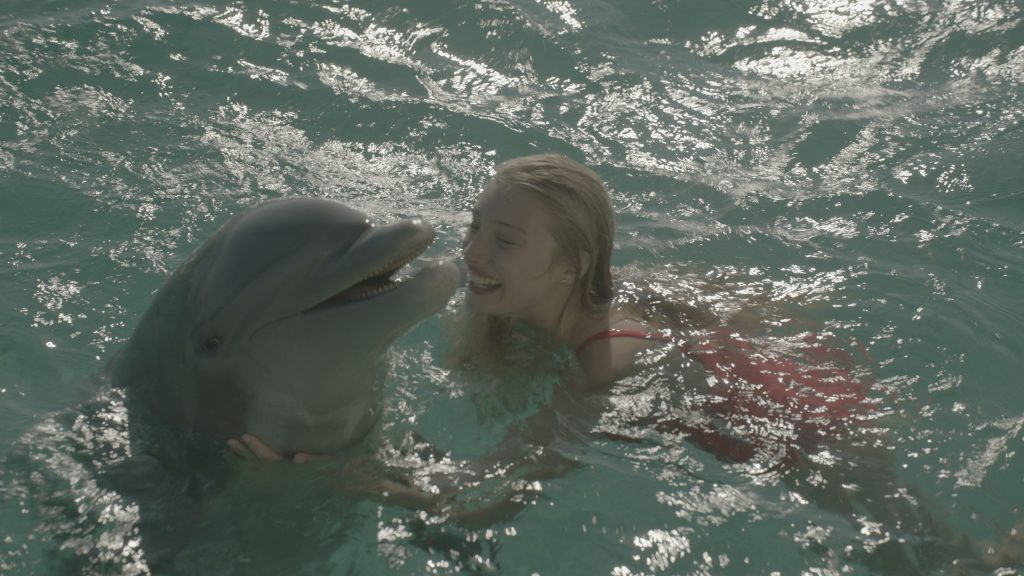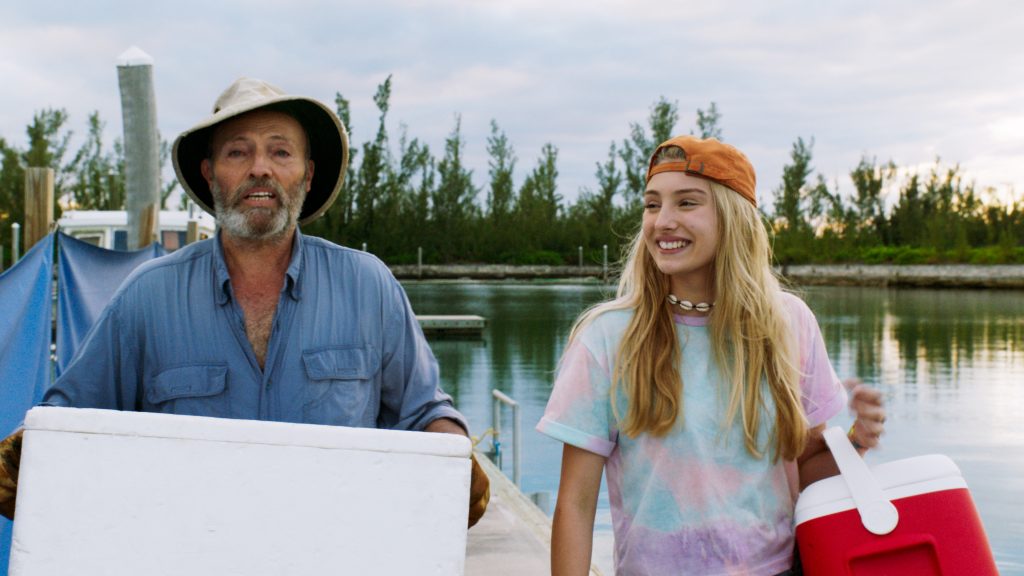April 7, 2021
by Carla Hay

Directed by Mike Disa
Culture Representation: Taking place in the Bahamas, the family drama film “Dolphin Island” features a racially diverse cast of characters (white and black) representing the middle-class and upper-middle-class.
Culture Clash: A British paternal grandfather, who has custody of his orphaned American teenage granddaughter, lives with her on a boat in the Bahamas, but the teenager’s maternal grandparents from New York City don’t approve of her living situation and want custody of her.
Culture Audience: “Dolphin Island” will appeal primarily to people who are interested in sentimental family-oriented entertainment, but the movie’s substandard acting and overly sappy screenplay will be too low-quality for many people’s tastes.

The filmmakers of “Dolphin Island” clearly intended to make this drama a family-friendly story. However, the movie has too much unrealistic corniness, sloppy predictability and terrible acting for it to be recommended to anyone looking for passably good, memorable entertainment. “Dolphin Island” is as formulaic as can be, but it’s made worse by the insipid dialogue and awkward performances by many of the cast members.
“Dolphin Island” was directed by Mike Disa, who co-wrote the movie’s screenplay with Shaked Berenson and Rolfe Kanefsky. The movie takes place in the Bahamas. And if nothing else, at least people will see some nice Caribbean scenery. But right away, the movie has a sheen of phoniness in the opening scene on an island pier, which features the local people acting way too upbeat and chipper, as if they’re in an infomercial for Bahamas tourism. You almost except them to break out into song, like a Disney musical.
British native Jonah Coleridge (played by Peter Woodward) has been living in the Bahamas for the past 10 years with his 14-year-old granddaughter Annabel (played by Tyler Jade Nixon) on a small house boat/fishing vessel that he owns. Annabel is homeschooled, and Jonah makes a living by giving boat tours around the island. Annabel’s parents were marine biologists who died 10 years earlier in a diving accident. Jonah’s son was Annabel’s father.
Annabel’s parents co-founded a non-profit wildlife research and conservation center, which is still open for business. However, it’s mentioned that business has slowed down because of the most recent hurricane. Annabel loves animals and ocean life, so it’s hinted that she probably wants to follow in her parents’ footsteps and possibly work at the wildlife center someday.
Jonah is currently a bachelor. His first marriage ended in divorce. His second and most recent wife is now deceased. After Annabel’s parents died, Jonah moved to the Bahamas to take permanent custody of Annabel because he didn’t want to disrupt her life by having her move to another country. And he also fell in love with the Bahamas.
The opening scene of “Dolphin Island” is intended to show that despite their family tragedy, Jonah and Annabel have managed to have a pretty blissful life together. And since this movie is called “Dolphin Island,” you just know that there’s going to be a cute dolphin that does tricks in the movie. Her name is Mitzy, and Annabel considers Mitzy to be her best friend.
Jonah and Annabel adore each other. And as they walk through the pier, which has local businesses nearby, everyone greets each other with smiles, waves and friendly banter. It’s all a big lovefest where everyone gets along with each other. Well, gosh golly gee willikers, isn’t that sweet?
Too bad some of this good cheer is ruined by embarrassingly bad lines of dialogue. Jonah, who likes to smile a lot, declares about Annabel and Mitzy: “Every day is a good day, as long I have my two girls!” When Annabel stops to talk to a couple of the local men lounging at the pier, she foists a corny joke on them: “Where does a fish keep money? In a river bank!”
This is going to be an excruciating stay on Dolphin Island because the bad dialogue gets worse. Annabel and Jonah have a near-perfect life in paradise. What could possibly go wrong?
The first sign that things are amiss comes when a teenage boy, who’s around Annabel’s age, pickpockets a wallet from an unsuspecting tourist. As soon as the boy has the wallet, he turns around and pretends that the wallet fell out of the tourist’s pocket and plays the role of a Good Samaritan who’s returning the wallet. It’s a well-known scam where the con artist hopes that the wallet owner will offer a reward for the “found” wallet. And it works, because the tourist gives the teenager some cash as a thank you.
The next time that the pickpocket pulls this con game on another tourist, Annabel sees it happening not too far away, and the boy notices that Annabel has witnessed him committing this crime. She shakes her head in disapproval and points at the boy silently to indicate that he needs to confess immediately. The boy sheepishly tells the tourist that the wallet wasn’t lost but that he actually stole it. The tourist accepts the boy’s apology.
One of the things that’s problematic about this whole scenario is its racist overtone. The teenage pickpocket is black and the tourists are white. When viewers find out who the pickpocket is, it’s obvious that there was no reason to portray him in the movie as a criminal. Movies and TV shows have already oversaturated people with negative stereotypes of young black men as criminals. It’s disappointing that a supposedly wholesome movie like “Dolphin Island” has pandered to this damaging and racist stereotype for no good reason.
It turns out (and this isn’t spoiler information) that the teenage boy is new to the area. His name is Mateo Rolle (played by Aaron Burrows), and he’s not a poor and desperate street kid. He lives with his divorced mother in a loving, middle-class home. The movie gives no explanation for why he was pickpocketing people. It’s a horrible way to introduce a character who happens to be black by making it look like this person is a criminal.
The movie also makes it look like Mateo’s “crime spree” ended only because Annabel stopped it, which is the filmmakers’ way of making Annabel (who is white) look more virtuous than Mateo. The racist subtext is pretty obvious. At any rate, now that Mateo has been shamed and has shown remorse, he and Annabel start talking and quickly end up becoming friends. Because that’s what happens in a corny movie like this one.
Meanwhile, Annabel is going to have more to worry about than busting teenage pickpockets. A child protective services worker named Desaray Rolle (played by Dionna Lea) from the Freeport Social Services Department has shown up on Jonah’s boat to let him know that she’s investigating him, due to a complaint that was filed about the living conditions he has for Annabel. Desaray says she’s taken over for the previous case worker who passed away.
Jonah is immediately defensive and argumentative. He makes a bad impression on Desaray, who is skeptical of Jonah’s proclamations that Annabel is living in a safe and loving environment. It doesn’t help that Desaray sees some local men napping on chairs nearby on the pier, with some beer bottles near the chairs. Desaray assumes that these men are passed out drunk and that Annabel is living among a bunch of degenerate partiers.
Desaray tells Jonah that she thinks Jonah is a “beach bum … I should know. I was married to one!” Even if viewers didn’t know Desaray and Mateo’s last name was the same, the way that Desaray and Mateo are introduced in the story makes it pretty obvious that they are both related, in order to create come more dramatic tension. Eventually, it’s revealed that Desaray is Mateo’s mother. And so now, Annabel has found out that her new friend/potential boyfriend Mateo has a mother who has the power to determine if Jonah is an unfit guardian or not.
Who filed the complaint to investigate Jonah for how he’s raising Annabel? Jonah finds out when he gets a visit from a sleazy lawyer named Robert Carbunkle (played by Bob Bledsoe), who tells Jonah that he’s the attorney for the people who filed the complaint: Annabel’s well-to-do maternal grandparents Samuel Williams (played by David Raizor) and Sheryl Williams (played by Annette Lovrien Duncan), who live in New York City. Samuel and Sheryl, who haven’t seen Annabel in 10 years, have decided that they miss Annabel, and they want her to live with them in New York.
Robert offers Jonah a sizeable amount of money to give up custody of Annabel to the other grandparents. An infuriated Jonah immediately turns down the offer. And it’s during this heated discussion that viewers find out, when Jonah tells Robert, that before Annabel’s parents were married, Samuel tried to bribe Jonah’s son to break up with Samuel’s daughter because Samuel didn’t approve of the relationship. Jonah’s son refused the offer. And when Samuel’s daughter found out about the bribe offer, she remained estranged from her parents until she died. Samuel and Sheryl last saw Annabel at the funeral for Annabel’s parents.
Of course, this custody battle turns into a war. Samuel and Sheryl eventually arrive in the Bahamas for legal proceedings. A lot of what the judge will decide depends on what Desaray puts in her evaluation report. But Jonah has already said and done a lot to alienate Desaray, even though the way that Jonah and Desaray met just screams “meet cute moment,” where people who dislike each other when they first meet end up being attracted to each other.
Samuel is more ruthless about the custody fight than Sheryl is because Samuel thinks he can buy his way into getting whatever he wants. Annabel and Jonah don’t want to be separated from each other, so there are tears and meltdowns aplenty. The acting from most of the cast members is just plain amateurish, with many of the actors going too over-the-top with melodramatics. Woodward has moments where he shows he has more talent than the other actors, but he too eventually sinks into the quagmire of mawkishness.
People who have seen enough of this type of formulaic mush can easily figure out what happens for the rest of the story. The last third of the movie has an almost-laughable “race against time” chase scene in the water, because we can’t forget that the dolphin has to be useful in this schlocky film. If you’re going to visit “Dolphin Island,” just know you’ll be stuck neck-deep in silly schmaltz that will leave you cringing.
Entertainment Squad released “Dolphin Island” on digital and VOD on March 2, 2021.
